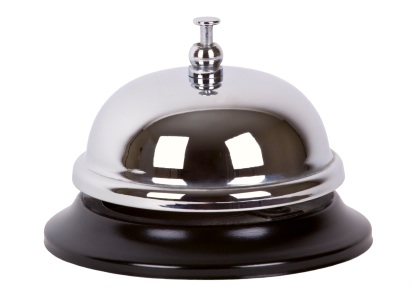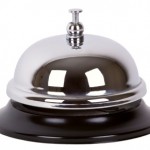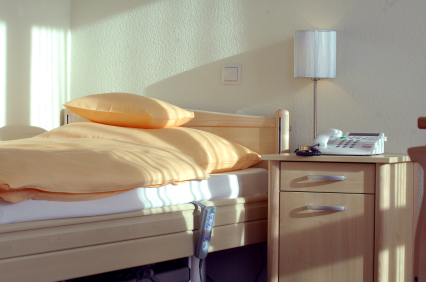Category: Customer service
Posted by Dr. El - September 22, 2011 - Communication, Customer service, Resident care, Resident education/Support groups

 “Tired CNA” posted a comment on my blog, saying she wished there were something that could be done about alert residents who ring their call bells 30 times a day. And there is. Here are some suggestions:
“Tired CNA” posted a comment on my blog, saying she wished there were something that could be done about alert residents who ring their call bells 30 times a day. And there is. Here are some suggestions:
- Residents who ring their call bells frequently are often anxious, needing what seems like constant reassurance. Quell their anxiety by visiting with them at the beginning of each shift, telling them who you are and when you’ll be by again next. Check in on them when it’s relatively convenient for you so they don’t have to call and interrupt you when it isn’t.
- Answering the call bell right away reduces resident anxiety and decreases the frequency of calling. Ring, answer, ring, answer, even if it’s to say that help will be there in ten minutes. Then show up in ten minutes.
- I used to wait tables and there’d always be that group of diners who would wait until I’d returned from one request to give me a second, and then a third when I returned from the second. I learned to ask “Is there anything else you need right now?” Try this.
- I provide “Call Bell Education” on the theory that the residents, most of whom have never been in a nursing home before, have no idea how much bell-ringing is considered “too frequent” by the staff (and some of them don’t use it when they should). It’s better to do this in a calm, informative manner when the residents first arrive rather than waiting until everybody is aggravated. As a CNA you could give them a ballpark figure of what’s considered reasonable during a shift, while assuring them that you’re there to meet their need for care. Part of the education process is helping them to identify when it’s important to let the staff know they require assistance (for example, they need oxygen or to be changed) and when it might be better to “group” requests (for example, if they want the window closed and the TV station switched, and meds are coming in ten minutes, they might as well wait for the nurse).
- If a resident continues to need a lot of assistance, consider moving them to a room closer to the nursing station, where staff members are more likely to pass by easily rather than having to walk all the way down the hall.
- Consider a referral to the psychologist. My residents know they will see me each week and can ask me for assistance with a wide variety of matters. This significantly reduces their anxiety. This week someone said to me, “I don’t know what I’d do without you. I really feel like you’re listening to me, taking my concerns seriously, and getting things done to fix them.” And I am. Include the psychologist on your team, and any other staff and family members you can enlist to improve the situation.
Posted by Dr. El - September 13, 2011 - Communication, Customer service, Resident care, Transitions in care


“What the f***!” Ms. Webster was red in the face, shouting at the nurse who’d just arrived for the evening shift. “The day nurse told me I was moving to the third floor — now you tell me I’m not? You people better get your s*** together!” She began hurling onto the bed the belongings she’d gathered into a giant trash bag earlier in the day. She muttered profanity as she did so.
“I’ll make some phone calls and find out what’s happening,” the evening nurse said nervously and then rushed out of the room.
There’s been a lot of attention paid recently to transitions in nursing care: moves between the hospital and nursing home, and moves between home and the hospital or nursing facility. Another transition that deserves attention is room changes within the nursing home. The importance of this passage is often overlooked, resulting in confusion, anxiety, and distress. Properly handled, room changes are an opportunity to create a positive customer service experience within your facility. Here are some points to consider:
- Prepare the resident (and family) for the change by informing them as far in advance as possible.
- Attend to the emotional reaction to the move, especially if it signals a shift from being a short-term resident to becoming a long-term resident. Consider a psychology referral to facilitate adjustment to the new floor rather than waiting until problems become entrenched.
- Try to make room changes early in the day so that one shift handles the entire transition.
- Do an “idiot check” to make sure all property is transitioned to the new room.
- Label clothing quickly and make the resident aware of the reason the clothing is missing.
- Provide an introduction of staff and a pleasant welcome to the new unit to reduce anxiety.
- Introduce the transferred resident to another resident or two with whom they might get along.
- Ask a long-time resident on the floor to welcome the new resident.
- Create a policy that guides transitions so that “short-term” floors stay short-term, avoiding the resentments that crop up when one resident is reluctantly moved while another resident who has been there longer remains on a supposedly short-term floor.
Posted by Dr. El - August 17, 2011 - Communication, Customer service, Medication issues, Psychology Research Translated, Resident care

 “Come on now, Vera, honey,” the nurse said in a high-pitched, sing-song voice, “be a good girl and take this nice candy.”
“Come on now, Vera, honey,” the nurse said in a high-pitched, sing-song voice, “be a good girl and take this nice candy.”
Vera swung her arm and knocked the tiny cups of pills to the floor.
In their 2009 study, Elderspeak Commnunication: Impact on Dementia Care, Kristine N. Williams, RN, PhD, and her colleagues report that resistiveness to care increases nursing home costs by 30%. They examined the way nursing staff speak to residents and its impact on the level of cooperation of residents with dementia. They found that residents became significantly more resistant to care when nursing staff used elements of elderspeak such as:
- simplistic vocabulary or grammar
- shortened sentences
- slowed speech
- elevated pitch or tone
- inappropriately intimate terms of endearment
- collective pronouns (“Are we ready for our bath?”)
- tag questions (“You want to get up now, don’t you?”)
They found that residents with dementia were more cooperative when spoken to in normal adult talk, and suggest the following research-based strategies in working with residents with dementia:
- normal talk
- reorientation
- distraction
- positive feedback
- memory aids
Posted by Dr. El - June 6, 2011 - Anecdotes, Communication, Customer service
I went for my annual mammogram last week, leaving work early to do so and throwing my schedule into chaos. When I arrived at the diagnostic center, the woman at the desk told me someone else would be out to talk to me. Never a good sign.
The second lady took an apologetic tone. “The doctor’s out today. I’m sorry. I thought I called everyone who was scheduled, but I must have missed you.”
“But I phoned this morning to confirm!” I replied with irritation.
After some negotiation and discussion with other people in the back room, they allowed me to have the procedure, with the understanding I’d have to come back again if more “views” were needed. It was a crapshoot, but better than wasting the whole trip.
I think of how often residents have told me, “They didn’t have the paperwork they needed, so we had to reschedule” or, “The ambulette driver couldn’t find the hospital and by the time we got there, the doctor had left for the day,” The residents were wrung out from the journey and from trying not to act irritated. Their anxiety about their next appointment would include the worry about whether or not it would transpire successfully.
Personal reminders like this increase my compassion for those living with illness, and my appreciation for the nurses, secretaries, and transport aides who check and double check that everything is in place so that residents only have to worry about their medical conditions and not whether or not they’ll make it to their appointments.
Posted by Dr. El - February 9, 2011 - Boomers, Business Strategies, Customer service, Technology, Tips for gifts, visits
I recently read an article about how the aging of baby boomers is causing some technology companies to focus on products geared toward older adults, often with the goal of helping them remain independent and at home for longer periods of time. But what about those older adults already living in nursing homes? What would help them be more independent?
Here are products I thought residents would appreciate, and ones I’d like myself when it’s my turn. Please add your suggestions in the Comments section:
- A motorized wheelchair
- A remote control for the air conditioner/heating system
- Windows that can open and shut by remote control
- A rubberized telephone that can withstand frequent dropping
- Wi-Fi
- Any adaptive equipment I need to use my laptop
- A staff paging system that doesn’t involve overhead announcements
Posted by Dr. El - November 29, 2010 - Boomers, Business Strategies, Communication, Customer service, Engaging with families, Technology, Younger residents

Looking for a great, inexpensive way to create some good will and holiday cheer at the nursing home this year? Why not set up a call center using Skype? Residents, families, and staff members can sign up to call loved ones around the globe, conversing with them via video call.
What it would take:
- A laptop or desk-top computer set up with FREE Skype
- A semi-quiet, semi-private area for conversations
- Tech support, or volunteers who know how to use Skype (for example. high school students or tech-savvy residents)
- A pre-call information sheet for families so they can set up Skype on the computers of those they plan to call.
- A sign-up sheet to maintain order in what is likely to be a wildly popular service
Posted by Dr. El - September 20, 2010 - Communication, Customer service, Resident care
Complaint #5: There’s no one here for me to talk to.

Untrue! But we need to prove it to residents by helping them connect with their peers.
The false impression they’re alone in the nursing home is based on several factors:
- New residents carry the prejudices of most people outside the nursing home, believing everyone inside is confused or too ill to carry on a conversation.
- The tendency of people to believe they’re unique, when in fact there are many uniquely interesting people in nursing homes. I know. I’ve spoken to them.
- Nursing home “old-timers” who are more alert tend to leave their units to attend activities. When newbies arrive, they try sitting in the hall or in the day room and, finding the more confused residents, they come to the conclusion that everyone is confused and then retreat to their rooms.
- Because most residents are visibly physically disabled, people often incorrectly assume they’re cognitively disabled as well.
Techniques for Family Members to connect residents include:
- Attending activities with loved ones and talking with other residents/families there.
- Asking nursing, recreation, and social work staff about other residents with interests similar to your loved one and helping to facilitate conversations about commonalities.
- Asking recreation, dietary, or nursing staff to seat your loved one near their friends during meals and activities if your loved one is unable to ambulate on their own.
Techniques for Staff Members to connect residents include:
- Introducing new residents to others with similar interests.
- Encouraging them to attend activities before they settle into spending their days alone in their rooms.
- Recognizing strengths and sharing them with others in the community. For example, a new resident agreed to be interviewed for a feature story in a nursing home newsletter.
- Helping residents establish a welcome committee.
Posted by Dr. El - September 9, 2010 - Communication, Customer service, Resident care
Complaint #4: Nighttime disturbances

The main culprits:
- TVs blaring into the wee hours
- Agitated neighbors
- Loud conversations between workers
Steps toward improved sleep hygiene:
- Implement a TV curfew and require night owl viewers to use headsets past the curfew
- Encourage night shift workers to report resident sleeplessness so sleep/wake cycle disturbances can be reversed and medications adjusted if necessary.
- As part of inservice training, address ways in which night staff can communicate with each other to avoid disturbing sleeping residents.
Good sleep hygiene on an individual basis can reduce irritability, improve memory, and promote healing. Good sleep hygiene on a unit-wide basis is good customer service that can benefit the physical and mental health of residents and reduce conflict between residents (it’s hard to be friendly toward someone who’s kept you up all night).
Posted by Dr. El - August 24, 2010 - Communication, Customer service, Resident care
Complaint #3: The Patient Lift

The patient lift is a machine used to transfer a resident from their bed to their wheelchair and back. No resident I’ve met likes using one, and I suspect the reason is the combination of loss of control, the frightening feeling of being suspended, helpless, in midair, and a lack of training which makes the procedure more alarming and uncomfortable than it needs to be.
When I was in grad school, all psychologists-in-training were required to undergo psychotherapy. Similarly, aides could gain perspective from a ride in the lift as part of their orientation or ongoing training. (I’d like to do this and blog about it, so if there’s a home in the New York Metro area willing to let me, please contact me.)
A professional approach by staff members with a focus on increasing confidence in the transfer procedure can reassure anxious residents. Techniques that reduce anxiety include:
- letting residents know what’s about to occur at each step of the process
- engaging in a dialogue with residents so they know the focus is on them
- listening to feedback about how they’re feeling (frightened, uncomfortable, etc) and responding to their concerns
What techniques do you use to make this procedure more pleasant?
Posted by Dr. El - August 10, 2010 - Communication, Customer service, Resident care
Complaint #2: The Food

Where is the Emeril of nursing home food? It’s time to kick things up a notch. There’s a huge opportunity for improvement in the quality, number of choices, and presentation of the food in nursing homes, and to affect the satisfaction of the residents with their meals.
A good start is to increase the food rotation schedule to at least a four week rotation. Residents also appreciate having their hot food hot and their cold food cold. Restaurant-style service, where residents are offered options while sitting at their table, is as popular as the flowers decorating said tables.
I’ve heard of facilities stimulating appetites by filling the dining rooms with the aroma of fresh-baked bread. What other meal-enhancing ideas are out there?
[Second post in a biweekly series. Here is Post #1]

 “Tired CNA” posted a comment on my blog, saying she wished there were something that could be done about alert residents who ring their call bells 30 times a day. And there is. Here are some suggestions:
“Tired CNA” posted a comment on my blog, saying she wished there were something that could be done about alert residents who ring their call bells 30 times a day. And there is. Here are some suggestions:



 “Come on now, Vera, honey,” the nurse said in a high-pitched, sing-song voice, “be a good girl and take this nice candy.”
“Come on now, Vera, honey,” the nurse said in a high-pitched, sing-song voice, “be a good girl and take this nice candy.”


